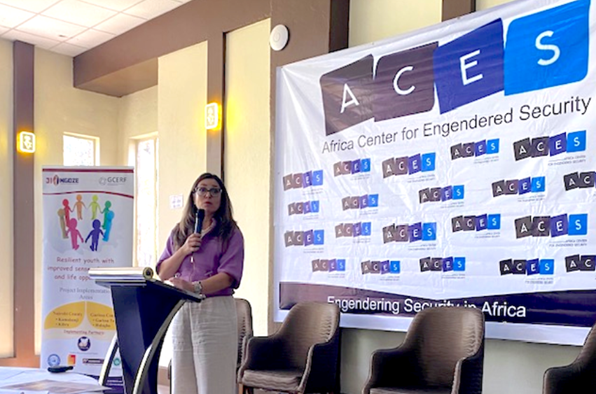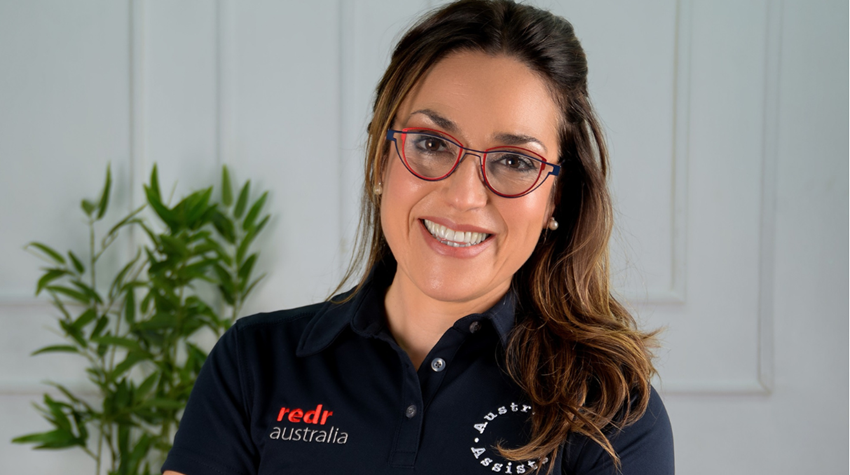With more than twenty years’ experience in gender and peacebuilding, Australia Assists deployee Marta, has witnessed and contributed to significant change for women and girls. While gender equality works toward a more equitable distribution of power, we also understand that it importantly contributes to peace and stability in the world.
“Many years ago in a high security meeting, one of the security officers came to me and said, ‘Do you have a weapon?’ And I said to him, ‘Yes, I have.’ And of course, the guy looked at me and said immediately, ‘So give me your weapon. You cannot get in with a weapon.’ And I said, ‘I cannot give you my weapon, because my weapon is my intelligence.’ He didn't understand my joke because he was so focused on guns.”
Marta explains that while men in many conflict settings have access to weapons such as guns, women usually do not. “Men see weapons as big things, a machine gun that could go and destroy people, but for women that will not be the case because they will not have as much access to those. They will rely on other skills.
Deployed through Australia Assists, the Australian Government’s humanitarian civilian deployment program implemented by RedR Australia, Marta has been based in Kenya with UN Women, as a Preventing Violent Extremism Policy Specialist. She has been helping to strengthen systems that protect women and girls from the impacts of extremism. Marta has been working alongside local colleagues on the design and implementation of a national prevention strategy.
In Eastern Africa, violent extremism is a pressing security threat as known terrorist groups continue to pose a significant risk to security and stability in the region. Kenya also shares a porous border with Somalia, a country identified by UN agencies as an “epicentre” for violent extremism. Kenya is often impacted by the spill-over effects of Somalia’s instability, and many women have been coerced into activities that threaten peace.
In a targeted response, UN Women continue to work in partnership with the Kenyan government developing policies aiming to help protect and support communities. This includes integrating international commitments on women, peace and security into national mechanisms, and helping to ensure that a gender perspective has been included in national counter-terrorism strategies.
A particular highlight of Marta’s deployment has been the Memorandum of Understanding (MoU) between UN Women and Kenya’s National Counter Terrorism Centre (NCTC). This gender focused MoU is an important avenue incentivising senior leaders to produce results on gender equality commitments, strengthen and adequately resource gender architecture; and accelerate results from the UN Country Team’s Action on Gender Equality strategy.
“The NCTC's acceptance of a gender specific MoU is a ground-breaking advancement on the path of having gender at the centre of security policy programming formulation in Kenya,” says Marta. “This is especially important in the security realm, which is still a male oriented space and one where gender inequality is significant.”
 Marta presented at the Africa Center for Engendered Security in February 2023
Marta presented at the Africa Center for Engendered Security in February 2023
The role of women in violent extremism
Tackling violent extremism requires a whole of community effort. “The meaningful engagement of women’s groups and faith based organisations to raise community awareness of terrorism groups’ recruitment tactics complements the government’s efforts to prevent violent extremism. Only joint effort will successfully change social stereotypes and reduce violence against women”.
Marta advocates for a nuanced understanding of the role of women in violent extremism: they are not only survivors, but may also be participants in fighting, recruiting, and supporting violent acts. As such, “the meaningful engagement of women’s groups and civil society is critical to preventing and countering violent extremism,” Marta says.
In Kenya, women are generally not actively involved in combat, but they can support conflict in other ways. “Women don't need to have a machine gun. But if you are persuasive, as women are, you can actually recruit a lot of other women. And that is dangerous. That is a weapon that you have in your power.”
The role of men in women’s empowerment
Fully realised women’s empowerment is not possible without the active participation of men. “I don't think that there are any issues related to women that can be improved without the participation of the men who are already in power,” says Marta. “It is not possible for women to get into a space that has been dominated for centuries by men if men won’t allow them to get in, without forcing our way in.”
“Forcing our way in has come with a lot of setbacks and creates a lot of resistance, and that may not be the best strategy,” she says. “Instead, it is better to focus on positive masculinity, male champions having a lot of conversations about how men can be involved in empowering women and how it is not a threat to their own masculinity and their own models. We need to engage men not to feel threatened, but to see equality as a way everyone can contribute equally on an equal footing.”
It's about equality
“For me,” says Marta, “It’s really about equality; lifting women and protecting women and girls. This is the work that I’m doing and supporting women in this environment. These stories need to be told.”
Learn more about Australia Assists and the work of deployees before, during and after emergencies.


